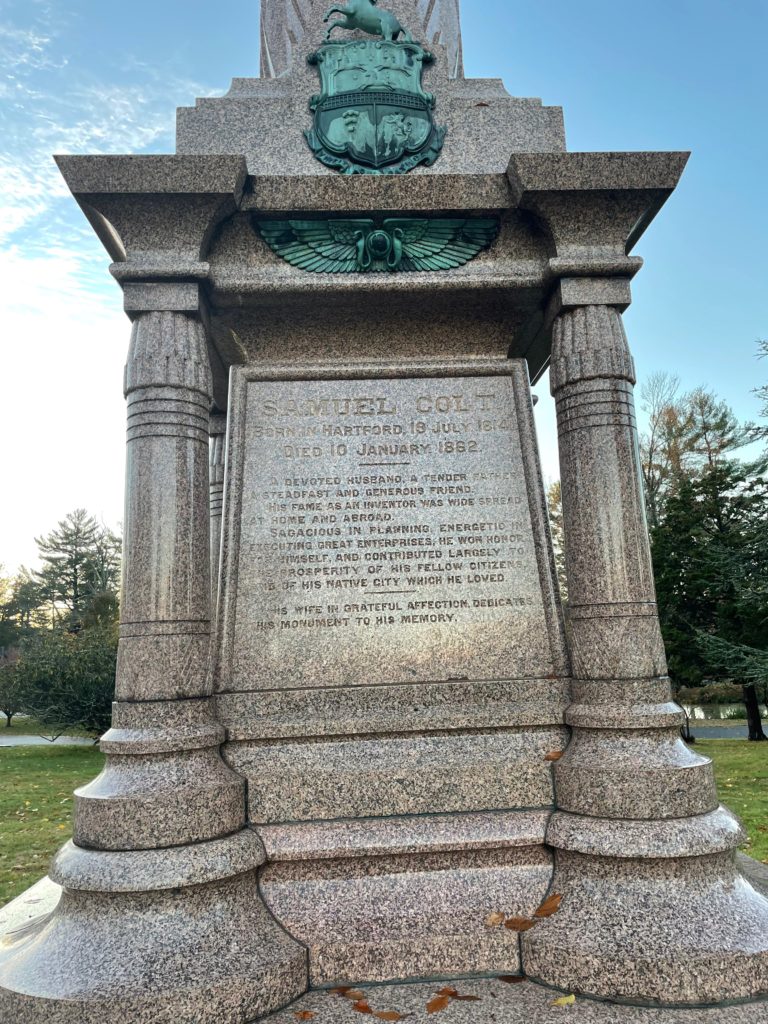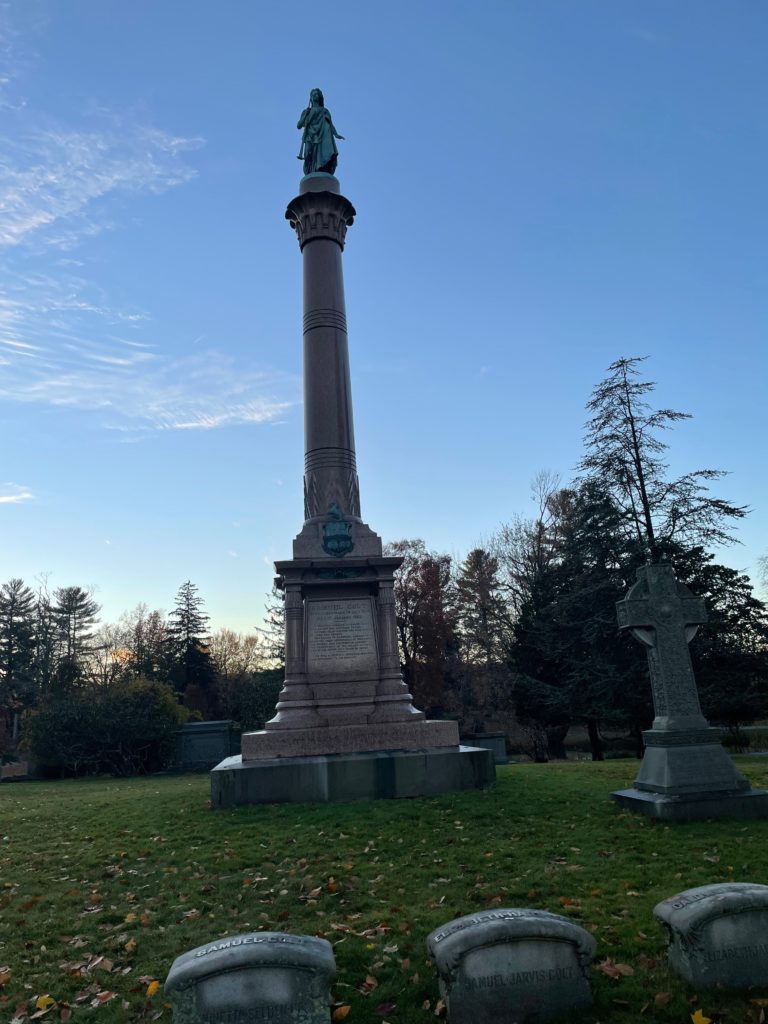Erik Visits an American Grave, Part 1,134
This is the grave of Samuel Colt.


Born in 1814 in Hartford, Colt grew up in a middling family. His grandfather was a major in the Continental Army and his father was a farmer who moved to the city to start a business, but the family’s success was just so-so. Colt was indentured out to a farmer as a youth, though he still attended school. He was supposed to read the Bible, but he thought it was boring. Instead, he read scientific manuals and became obsessed with the new inventions of the day such as the steamboat and gun technology. He determined this would be his future.
In 1829, Colt went back to his family to work at his father’s textile mill, now in Ware, Massachusetts. In his spare time, he tinkered with explosives and pulled off an impressive explosion on the fourth of July in 1829, which he had heavily advertised. The next year, now at boarding school, he had another explosion experiment on July 4, but this one set his school on fire. So….that was it for schooling for the young boy.
Instead, his father, somewhat disgusted, sent him to sea. He continued tinkering with guns while on his two years at sea and when he returned in 1832, he had created advanced enough designs that his father decided to give him some seed money for investment in the project. It wasn’t enough money though and so Colt actually funded his dream by going on tour conducting nitrous oxide experiments on people, who evidently paid for this entertainment. In fact, he became quite an entertainer in these years, developing fancy shows and increasing his power as a salesman that would serve him well later.
Colt kept at his gun dream and in 1835, had enough money to go to England and learn from the best. He did and he also brought his own Colt revolver there. The British gave him a patent for it. The next year, he started a company in the U.S. to promote it. He didn’t invent the revolver but he did improve the use of interchangeable parts in guns. Initially this actually led to problems. He sold some of his guns to the Army in 1837 for use in the Seminole Wars, but the soldiers were unused to this and so took apart the guns themselves and broke them. Colt was also a fancy boy who spent a ton of money on clothing and other luxuries, which definitely did not help the company’s finances. It went broke in 1843 and he had to declare bankruptcy.
A tinkerer, he was not going to give up on selling his goods. In addition to his guns, he worked on electrical detonators and underwater cables and sold some of them. He developed some underwater mines as well and the Tyler administration wanted to buy them, but John Quincy Adams stopped this in Congress, saying it was a horrifying weapon that had no place in warfare and that Colt’s invention was an “unchristian contraption.” He worked closely with Samuel Morse on telegraph technology as well, particularly laying underwire water.
Colt finally got his gun empire after the Mexican War. Samuel Walker, a Texas Ranger, had used his guns in the Seminole Wars and liked them. He traveled to New York to outfit the Rangers with Colts for the war to steal half of Mexico to expand slavery. Colt was very cool with this. Walker had to first find Colt and when he did, he told Colt of improvements he wanted to see to make it easier to fire when moving and more likely to kill someone with a single shot. Colt agreed and the huge order allowed him to restart his company. Pretty quickly after this, the Colt became the sidearm of choice in the West, leading to a lot of shooting and killing.
Now that Colt had success, he had to spend most of his time defending his patents and getting Congress to extend them. This was almost always a chore for 19th century inventors. His intensive protection of his patent rights–and his willing to use lawsuits to back them up–is what actually made his company successful. Otherwise, other companies just would have stolen the technology and sold the guns, probably more cheaply. In 1854, a story came out that Colt had bribed politicians to get his patents extended. I’m not sure if this is true. But in any case Scientific American did a big story on it and it was very much to Colt’s benefit, not really denying that it was possible but saying Congress was filled with awful bribe-seeking politicians who would stop a quality weapon from being produced in order to fill their pockets with graft. This forced whatever was holding him up in Congress out of the way and Colt quickly had a near-monopoly on revolvers, which allowed him to expand his business to Europe, where they also liked killing and had large armies to do so.
Colt then built large factories for his guns, particularly in Hartford, leading Connecticut to become the center of American gun manufacturing, which I believe it still is today. He helped pioneer the idea of the assembly line in the Hartford factory, a half-century before Henry Ford, who often incorrectly gets credit for the idea. It wasn’t that Colt invented the idea or anything, but he could implement it effectively because of his interchangeable part innovations. For his European operations, he built a factory outside of London. He actually convinced the governor of Connecticut to make him a lieutenant colonel in the militia, not because he wanted to fight or anything, but because European heads of state, ridiculously concerned with rank and title, wouldn’t meet with him if he didn’t have proper military credentials. Since it was only the credential that mattered to these people and not the man or the experience, an honorary title in the militia was enough. In any case, Colt’s guns were a big improvement on what Europeans had available to them and so they bought them up in huge numbers. Since the 1850s was a good decade for European wars, particularly the Crimean War, Colt made tons of money.
Colt was a true capitalist in that he had absolutely no morals, positions, or scruples except for profit. He routinely sold guns to both sides in European wars. When the Civil War was moving toward starting, he took the same position in his own country. He sold tons of guns to Southern buyers well through 1860 and into 1861 and as late as that year, considered opening a second factory in the South so if secession did happen, he could make tons of money and his business wouldn’t be interrupted. Even when treason in defense of slavery occurred, he still sold 2,000 guns to a Confederate agent in 1861. Colt simply didn’t care. Finally, he came in for real criticism, though it wasn’t yet illegal. Major newspapers called him a traitor. He was outraged. He couldn’t be a traitor to the only nation that really mattered–his wallet. Colt then volunteered for the Connecticut militia for real in response, seeing his business being threatened. He never saw the field.
In any case, he died in early 1862 from complications from gout, which…..can one die from gout, at least in a way nineteenth century people would know this? We do know today that gout can cause other problems such as renal failure than can lead to early death, but I don’t think they had that kind of information in 1862. So, anyway, he was unhealthy and he died at the ripe old age of 47, one of the richest men in America.
Samuel Colt is buried in Cedar Hill Cemetery, Hartford, Connecticut.
If you would like this series to visit other key figures of American gun culture, you can donate to cover the required expenses here. Alas, Wayne LaPierre lives. But Harlon Carter is in Tucson, Arizona and John Moses Browning is in Ogden, Utah. Previous posts in this series are archived here.


